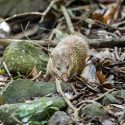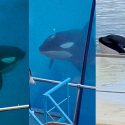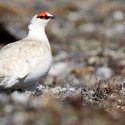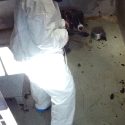Cats and dogs: the end of pet shop sales, the start of ‘click and collect’
Cats and dogs: the end of pet shop sales, the start of ‘click and collect’
15.01.2024
France
Cats and dogs: the end of pet shop sales, the start of ‘click and collect’
Domestic animals
This is an innovation of the law of 30 November 2021: the sale of cats and dogs in pet shops has become illegal as of 1 January 2024. Although this is a step forward in the fight against reckless and irresponsible purchases ‘on paper’, in fact, with it having only just come into force, these steps are easily abused. One Voice is rising up against this abuse.
Photo: Jo-Anne McArthur/One Voice
For several days now, we have been receiving a multitude of reports throughout France informing us that this or that pet shop is continuing to display and sell puppies or kittens. But some also highlight even more despicable actions.
Animals sold like objects with ‘click and collect’
Some pet shops, refusing to put an end to their business that is now illegal, are offering new services: to avoid losing money, they are now encouraging people to buy the animal on their brand’s website before coming to collect it from the shop. Like we do for our grocery shop…
Without even trying to hide it, they also explain that the puppies continue to be delivered to the shop despite the sales ban that dates back almost two weeks! Just after the vote on the 2021 law, we were already denouncing the lack of implementation of these measures in pet shops on the Côte d’Azur.
The Ministry of Agriculture is an instigator
But perhaps our leaders had not anticipated this eventuality…? This is not the case. It is the Ministry of Agriculture themselves who came up with this idea, proposing to regulate this practice instead of banning it:
«The Ministry of Agriculture indicated […] that this ban on transferring consists of a ban on the physical presentation of dogs and cats in pet shops and not a more general ban on the transfer of these animals by pet shops. The Ministry therefore believes that, if pet shops are not authorised to present cats and dogs for sale in a pet shop, they can hand them over online in return for payment. The Ministry is therefore in the process of assessing this activity, in particular by considering regulating the conditions for keeping cats and dogs as well as the conditions for handing animals over. The Ministry thinks that a modification of the regulatory provisions or training will be necessary on this subject. (sic)»
A ban that is insufficient to a great extent
The spirit of the law has been completely perverted, and impulsive purchases will be able to continue. If we do nothing, this will not get better, because puppy show kind of events are still legal and blithely trample on the reflection period, an already minimal measure imposed by law. And as animal trade has good days ahead of it, personal classified adverts are also still relevant. We are demanding an end to online sales, and it is for this reason that we filed a complaint against Leboncoin last November.
Rodents, fish, birds, and reptiles are not protected and continue to be sold like simple consumer items while associations are regretful of the annual increase in them being abandoned.
As long as animals are sold as objects and then thrown away, our companions will continue to be mistreated. Together, let’s demand an urgent plan against feline straying to put an end to abandonments and to slaughtering in pounds.
Translated from the French by Joely Justice









